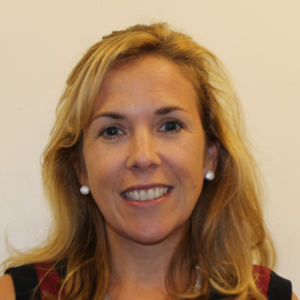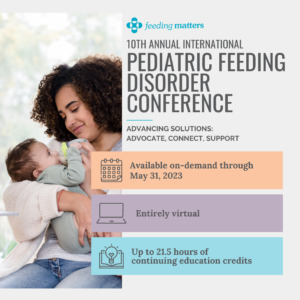4 things every pediatric occupational therapist should know
Published by Kate Barlow, OTD, OTR/L, IMH-E on Apr 25, 2023
In honor of occupational therapy month this April, a leader in addressing pediatric feeding disorder shares what OTs can do to improve care for children

By Kate Barlow, OTD, OTR/L, IMH-E
Associate professor of OT at AIC
Early in my occupational therapy career, I worked with a girl who appeared to be in pain every time she ate. She couldn’t speak or communicate well, but it was clear to me that something was wrong.
After checking with her mom, I expressed my concerns to her pediatrician, who instructed me to continue offering milk. It was then that I encouraged the mother to find a developmental pediatrician.
Through evaluation and my conversation with the developmental pediatrician, the girl got a G-tube. She gained weight. Her whole demeanor changed once she was no longer uncomfortable. It was the first time I felt the power of advocating for one of my clients.
As occupational therapists, we always make the best estimates based on our experience and clinical observations.
This was an important lesson for me that I need to trust my gut and be there for my clients. If we as clinicians don’t push for those kids and families, they may not get the care they need.
I’ve been advocating for children with feeding issues ever since.
Feeding is among the main reasons kids are referred to an occupational therapist (OT). And yet, as an OT, I see that the work we do for kids’ feeding issues is an area that needs improvement. With more awareness, education and system-wide assessment tools, all children with feeding issues can access better care.
Universal screening for feeding issues would identify more children who need support earlier
Feeding issues in young children are so common that I believe all children should be screened for feeding concerns. Similarly to school-wide hearing and vision testing, feeding screening should occur in early childhood education centers and schools. We as OTs should advocate for universal screening for feeding issues.
Conservative evaluations estimate that PFD affects more than 1 in 37 children under the age of five in the United States each year. That rate is even higher for children with developmental delays.
A recent study indicates that feeding problems could indicate a developmental delay. Results showed that compared with children who never experienced feeding problems, children who experienced high feeding problems at one or two time points were more than twice as likely to have a delay on all Ages and Stages Questionnaire (ASQ) domains. Children who experienced high feeding problems at all three-time points were four or more times as likely to have a delay on all ASQ domains.
OTs and SLPs need a comprehensive screening tool
With the help of a Feeding Matters grant, Dr. Paula Rabaey and I completed a research study, “Investigation of Assessment Tools in the Area of Pediatric Feeding Evaluation: A Mixed Methods Study.” We surveyed 263 pediatric occupational therapists and 182 speech and language pathologists who identified as pediatric feeding therapists. Results showed that OTs and SLPs use various assessment tools. Non-standardized assessment tools were most commonly reported in assessing all four domains of pediatric feeding disorder: medical, nutrition, feeding skill, and psychosocial.
The results indicated a clear need for a standardized assessment tool covering all pediatric feeding disorder domains. The research will be published in the American Journal of Occupational Therapy this summer.
Clinicians need to continue constantly learning
Today’s occupational therapy programs include more pediatric feeding, eating, and swallowing education. In order for occupational therapists to stay up to date on pediatric feeding issues, all feeding therapists need to participate in continuing education courses.
The International PFD Conference from Feeding Matters is an excellent way to level up your pediatric feeding skills knowledge. The conference features the latest research and methods from leaders in the field and attracts clinicians of all levels of experience. The virtual conference is available live Thursday, April 13 through Friday, April 14, and then virtually until Wednesday, May 31.

Feeding therapy needs to be culturally sensitive
We as clinicians do a great job of educating parents, and it is important to be culturally sensitive when working with families. I recently received the infant mental health endorsement – IMH-E – emphasizing the importance of culturally sensitive, relationship-focused practice.
It’s important to consider a family’s cultural norms, home life and income level when recommending what foods children should or shouldn’t eat and how they should approach mealtimes.
We need to ask open-ended questions to access information we might not have even considered and so that families don’t feel judged by any insinuations.
For parents, struggling to feed a child is extremely challenging. It’s our job as clinicians to do everything we can to make that a little easier.
Kate Barlow, OTD, OTR/L, IMH-E® is an associate professor at American International College. She’s also the current ambassador for the CDC’s Learn the Signs. Act Early. program for Massachusetts. She has over 20 years of clinical experience that includes public school practice, early intervention, a pediatric hospital-based outpatient clinic and management. Her areas of clinical expertise are early identification of delays and pediatric feeding.